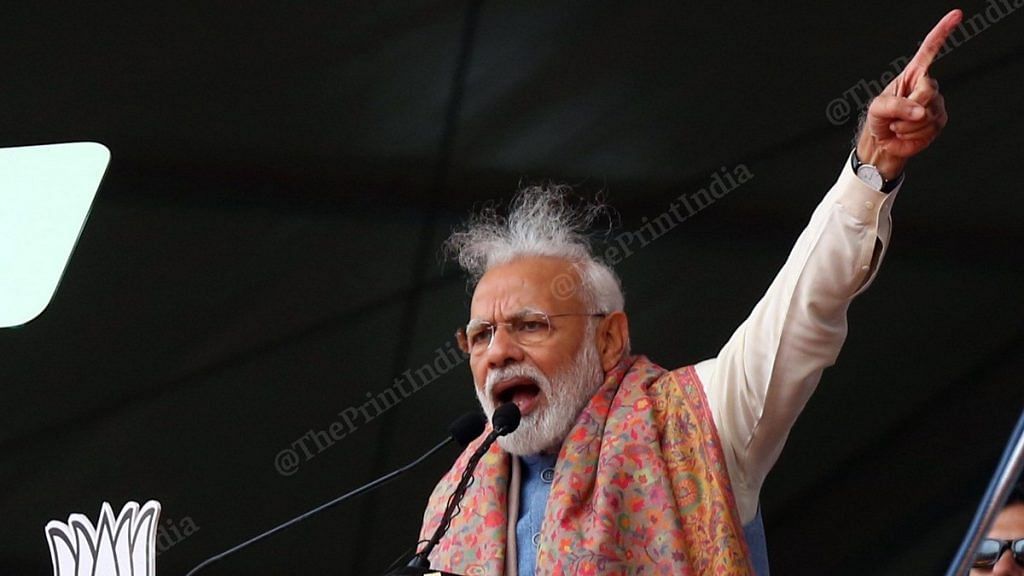New Delhi: Prime Minister Narendra Modi kicked off the BJP’s Delhi election campaign Sunday, addressing a massive gathering at the Ramlila Maidan, barely a kilometre from Daryaganj, the scene of violence during protests against the country’s new citizenship law Friday.
Modi lashed out at the opposition for spreading “misinformation” and “lies” on the Citizenship (Amendment) Act (CAA), and appeared to distance his government from the National Register of Citizens (NRC), which he said is not being considered as of now. However, there were things the PM said that are being contested as “facts”.
ThePrint did its own fact-check on PM Modi’s speech. Here’s what we found.
Also read: BJP MP Tejasvi Surya says NRC will be implemented, day after PM said no decision on it yet
No talks about NRC
Claim: PM Modi said Sunday that his government or Parliament haven’t discussed the NRC. “There are no talks about it at all,” he said.
Fact: President Ram Nath Kovind, addressing a joint sitting of the two Houses of Parliament on 20 June 2019, said illegal infiltrators pose a major threat to internal security, leading to a social imbalance in many parts of the country, as well as putting huge pressure on limited livelihood opportunities.
“My government has decided to implement the process of ‘National Register of Citizens’ on priority basis in areas affected by infiltration. Security along the border will be further strengthened to prevent infiltration,” the President had said.
Also, Home Minister Amit Shah said in Rajya Sabha during the winter session this year that the NRC will be implemented across the country. He repeated the same promise at an electoral rally in Jharkhand’s Singhbhum, saying the BJP government will expel all intruders before the 2024 polls, which seemed to set a deadline for the nationwide NRC.
No detention centres in India
Claim: On the issue of detention centres for those caught in the NRC net, Modi said at Ramlila Maidan: “No Indian Muslims are being sent to detention centres, nor are there any detention centres in this country.”
Fact: There is substantial evidence to prove that there are multiple detention centres in India. Even the government, in the official record, has acknowledged their existence.
Responding to a question in the Rajya Sabha on 27 November 2019, Minister of State for Home Affairs, Nityananda Rai, said: “As informed by the state government of Assam, as on 22 November 2019, 988 foreigners were lodged in six detention centres in Assam.”
The minister added that between 2016 and 13 October 2019, 28 detenues had died either in the detention centres or in hospitals where they were referred.
Also read: Vajpayee-Advani imagined an all-India NRC and Modi-Shah added a Muslim filter
Citizenship only for refugees living in India for years
Claim: While trying to assuage people’s fears about the citizenship law, Modi said it would not deprive the poor of their resources as it will only grant citizenship to refugees who have been living in India for years, rather than those who have entered India recently.
Fact: The PM is correct, in that the amendment to the Citizenship Act makes it clear that Hindus, Sikhs, Jains, Christians, Buddhists and Parsis who have been residing in India before 21 December 2014, will be granted citizenship. The beneficiaries will be 33,313 people, who had fled persecution from Pakistan, Afghanistan and Bangladesh.
However, if any person of these religious denominations from these three nations entered India after this date and applied for citizenship, the new law would not be applicable to them. They can only apply for citizenship under the 1955 Act after completing 11 years of stay.
Honours from Islamic nations
Claim: Modi said Sunday that India’s relationship with countries with Islamic nations had never been better.
“India’s relations with Palestine, Iran, Saudi Arabia, UAE and Jordan are at an all-time high,” he said, adding that Afghanistan, Palestine, Saudi Arabia, Maldives and Bahrain had conferred their highest civilian honour on him as Prime Minister of India.
Fact: Maldives, the UAE and Bahrain conferred their highest civilian honours to Modi in 2019 — the ‘Rule of Nishan Izzuddeen’, the ‘Order of Zayed’ and the ‘King Hamad Order of the Renaissance’ respectively.
Palestine conferred on him the ‘Grand Collar of the State of Palestine’ in 2018.
Saudi Arabia had conferred the King Abdulaziz Shah on him in 2016, the same year that Afghanistan had given him the Amir Amanullah Khan Award.
Also read: Stop complaining India’s anti-NRC, CAA protests are ‘too Muslim’
